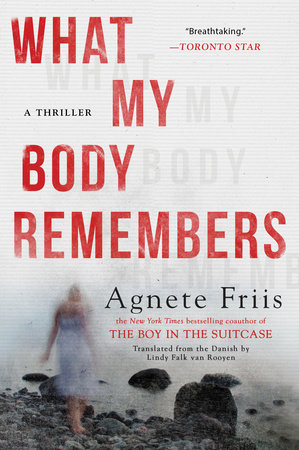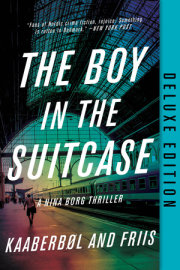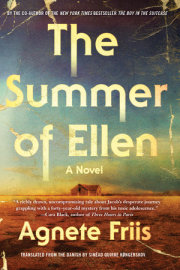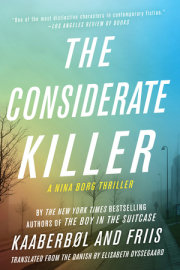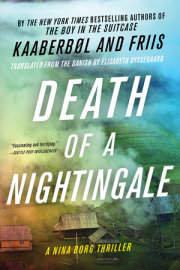“Can’t you get him to shut up at night?”
Rosa came to stand next to me on the gallery and took out a cigarette. Her hair was platinum blonde, if one were kind enough to ignore the ten-centimeter band of liver-pâté roots on top. Her skin was pink and chronically pocked, a skin condition from half a life of alcohol and too much sun. Her color combination reminded me of Neapolitan ice cream melting in the sun; chocolate, vanilla, and strawberry. The cheap stuff they dished up at Bakkegården when it was time for a party.
“He’s got nightmares. He can’t help it,” I said flatly.
We’d had this conversation hundreds of times before, practically word for word, but Rosa had no sympathy for social aberrations of this kind. Her life—as I had come to know it in the two years we’d lived in the apartment next door—was little more than an endless row of repetitions. Morning coffee with the husband at eight, shopping at Netto at ten, rye bread with meat and raw onions at twelve. Then, two hours on the sofa with an indefinite number of Kodimagnyl and Valium swimming in her blood. Cake, coffee, and TV at three. Dinner with the husband at six. Some kind of fried meat, potatoes, and cooked vegetables. Then more TV, more coffee, and a stack of smokes. Washing was done Monday. Lotto Wednesday and Saturday.
“It’s not normal for a child his age,” she went on.
I was inclined to agree, but didn’t say so out loud. Alex’s nightmares were undiluted terror and, according to Doctor Erhardsen, most common amongst preschool kids. Alex was eleven, almost twelve.
“And what do you suggest I do about it?”
Rosa wrinkled her nose and looked away.
“He keeps us up, for Christ’s sake. And Jens has to be fresh for work in the mornings.” Her voice was tobacco-rough, no trace of a smile. “If your son were a dog, we would’ve had the super put him down.”
Dry laughter.
The walls of our concrete apartment complex were thin as eggshells; after eleven, anything going on next door always felt like a blatant lack of consideration.
Rosa coughed, smacked her chest with a flat hand and sighed dramatically.
Have you been to see Erhardsen about that?”
She nodded.
“It’s the lungs. I’ve got to keep taking the pills.”
“That’s not what I meant,” I said, clapping her on the shoulder. “I meant that thing you’ve got stuck up your ass. It’s been there for quite a while.”
“Shut the fuck up!”
She choked a smile, and I turned my back to fish a hand-rolled smoke out of my jeans pocket. I kept them in an old King’s pack, so they smelled traitorously like the real thing, but tasted all wrong. When I needed nicotine, I had to smoke three of the handrolled before I could feel the same lull in my bones that a single King’s could deliver. But it was still cheaper, and it was seldom that I smoked for the sake of the nicotine. The smokes were a habit; something to do with my hands, an excuse to stand on the gallery and look out over the other apartment blocks. We all need something to apply ourselves to. Even the apes at the zoo are made to pick sunflower seeds out of coconuts with a stick so they can sense the meaning of life. When we went to see the apes for Alex’s seventh birthday, the zookeeper was kind enough to explain this to us. The habitual activity with the seeds makes the chimps happy, he said. They’re also fond of smashing cardboard boxes, snapping twigs, and throwing shit at the other apes. Actually, I was envious of them. It seemed like a much more meaningful occupation than the kind of crap those idiots from Welfare had me doing.
The wind was blowing from the east today, bringing the smell of exhaust fumes and warm asphalt from the parking lot along with it. I leaned over the railing, just far enough to feel the pull of the deep drop.
“You’ve got to get him to stop screaming,” Rosa mumbled behind me. “He’s too old for all that.”
“Okay,” I said, without looking at her. “I love you too, Rosa.”
I could hear her disappear into the apartment next door and lock the door behind her.
We were a fragile alliance, Alex and I; a freak and a skinny eleven-year-old boy. I was the only family he had, and he was mine, and although we’d spent the last eleven years in numerous apartments amidst various people on the dole or early pension with phobias about earth rays, allergies to electricity, and aches and pains in mysterious parts of the body, we still stuck out like pubic hair on the pussy of a porno star. I had no friends to speak of. In fact, there was only Rosa, and my friendship with her was, well . . . complicated.
Officially, Rosa had been diagnosed with a pelvic girdle disorder after the birth of an oversized diabetic boy some twenty-three years ago, when she had been declared unfit for work. Unofficially, it was an open secret that both Rosa and Jens had been permanently drunk up till about three years ago. The social authorities’ forcible removal of their son, Michael, was one of the most spectacular stories in the history of our apartment block. Rosa had left the five-year-old Michael in the care of the dead-drunk Jens while she herself went grocery shopping: beer for the adults, rye bread, liver pâté, and milk for the boy. On her way back she was overtaken by the fire brigade, and by the time she got home, a small gathering of residents were standing on the tiles under their fifth floor window, where Michael was sitting watching the world go by, his feet dangling in thin air. The firemen managed to break down the front door before Rosa arrived on the scene with the keys, and afterward there was a screaming performance when Michael was brought down from the window and driven away. Jens had apparently slept through the whole thing, leaving Rosa to sob alone on the couch in a haze of alcohol.
For my own part, I had only known her sober, and she was one of the most respectable people I had ever met. She didn’t smile very often, but she was honest. She did her best not to gossip about other people, which was as rare as life in space here in Ghost Town.
The heavens opened in the same second I caught sight of Alex. He came running through the crash of warm water with his arms stretched out wide, as if he were flying. The steam stood off his scraggly frame and his dark fringe clung to his forehead in jagged tufts.
I leaned out over the railing and whistled to get his attention. He smiled when he saw me and a moment later I could hear him rhythmically banging the banister, all the way up from the bottom of the staircase. He didn’t like taking the lift on his own. He was afraid it would get stuck, or crash, and there was a permanent stench of piss from that shiny-black blotch in the corner. He was a sensitive child; his nerve endings were frayed. The child psychologist said it was something he’d inherited from me, but I don’t buy it. When I see myself at age twelve, I see an angry forbidding girl, crew cut with small beady eyes.
Alex let his fingers run along the rails of the banister till he got right up next to me.
“Are you hungry?”
He nodded and we went into the kitchen, where I buttered a couple of slices of toast on the mottled kitchen counter. Presumably the surface had once resembled marble, but now it looked like what it was: worn, yellow plastic. I wiped the crumbs off the counter with a cloth, swearing under my breath. It smelled foul, stiff with dried porridge. The washing basket in the bedroom was overflowing and I desperately needed a twenty-kroner coin for the Laundromat.
“Do you want to go to the park with me?”
I put a hand on the back of his damp neck, but he pulled away from me. This was new.
“It’s pouring,” he said. “Can’t we wait a while?”
“Nope, we can’t. It’s the perfect weather for collecting cans. We’ll have the whole place to ourselves.”
I went into the hallway and rummaged in the cupboard for my raincoat and Alex’s yellow windbreaker. It was too big, bought on sale. You could draw it tight round his face so only his olive-skinned nose poked out the front.
He shot a skeptical glance at the mirror.
“I hope we don’t fucking bump into anyone we know.”
“Don’t swear.”
“And I hope we get there before Sveske.”
Sveske was a scavenger and can-collector and lived on the stairway opposite ours. He was a cute little tyke, as long as you didn’t come on his turf—then all hell broke loose. The words that came out of his mouth were so filthy that even the bigger boys kept their distance when he lost his temper. Sveske usually collected the empty bottles and cans on the eastern side of the apartment block—and in the park, of course. But the park was fair game, a common expanse of grass—it was simply a question of first come, first serve.
We went down to the little stream together, each with our own plastic supermarket bag from Aldi. My flip-flops slipped on the wet grass and I had difficulty keeping up with Alex, who jogged on ahead, his hood still pulled down low. There was thunder in the clouds, and the rain was heavy and warm.
Splash.
Alex landed in a puddle right next to me, both feet planted close together, and muddy water splashed up over my legs.
“You little brat!”
Alex laughed, and ran, sprinting ahead for all he was worth in his flapping galoshes, but I caught up with him quickly and tackled him from behind, bringing us both down onto the muddy grass. I’d have to wash his clothes by hand, but as long as it didn’t cost me any coins for the Laundromat machines, it was worth it. We were soaked, but he was grinning from ear to ear. He wrinkled his nose.
“There’s got to be duck shit in the water,” he said, pointing down to the stream, where the ground was marshy, clogged with the last couple of days’ rain. Shiny water covered the lawn and a few clucking ducks waded about in the newly created biotope.
“Sissy.”
I tore off one of his galoshes, got up, and swung it triumphantly over my head like an Olympic hammer thrower.
“Come and get it.”
But Alex stayed where he was, his smile had disappeared. The transformation was so complete that at first, I thought he was joking.
“Stop it, Mom. You’re acting like an idiot.”
I followed his gaze and saw a flock of elder boys with school bags slung over their shoulders making their way over the grass in exaggerated slow motion. One of them cast a velociraptor-like glance in our direction without seeming to fix on anything in particular. Then they went along their way, cajoling each other in broken voices and high-pitched whoops.
I looked at Alex, who got up swiftly, half-turning away from me and pretended to study something important in the space between his feet.
“You can’t just rip off my galoshes in the middle of the park,” he said, angry tears choking his voice. “Now look what you did!”
He grabbed the boot and shoved his foot into it furiously. Then he picked up the Aldi-bag he’d lost in the tackle and steered straight for the nearest trash can and bench.
I remained standing for a moment to look after the group of boys, who were now on their way up the path to the concrete blocks, but I didn’t recognize any of them. Or rather, I didn’t think I did. The bigger kids from the complex all looked the same: enormous, tentlike hoodies with denim jeans and chunky shoes in winter. Huge T-shirts, shorts, and the same chunky shoes in summer.
Alex fished a beer can out of the garbage with two fingers as I waded through a puddle, following the gravel path to the next bench. Bingo. Two empty soda bottles and one mineral water. Just twenty minutes more, a trip to Hvidovre Square, and there would be enough coins for a cycle of washing at the Laundromat and two cupcakes from the bakery.
I waved my loot over my head, and Alex looked up and waved back. The gang of boys appeared to be forgotten, but he still pulled his yellow hood down over his eyes and turned his back when I tried to send him a smile. I recognized that look of shame; till now, we’d been a good team, Alex and I, but he was starting to look at me with a stranger’s eyes. Not all the time, but more and more often, and eventually he’d desert me altogether. I could feel it, as I fed the empties into the automat outside the Netto store, and I could feel it afterward, when we went to the bakery. That measured glance, which saw me from the outside: Ella Nygaard, 28-year-old woman on the dole. Thin legs sticking out of a pair of denim shorts, feet stuck into a pair of pink flip-flops scavenged from the Red Cross’s clothing container.
We walked home in silence.
In the foyer to our apartment block, I checked our mailbox.
The envelope was narrow, skimmed milk-white, and covered in postage stamps and markings. Tiny imprints of Buddha in orange overalls, elephants, and colorful flowers, all bunched together with my name and address.
The cupcakes fell out of my left hand and landed on the concrete floor with a soft thump. I could hear Alex pull up behind me, and I told myself that I could get through this, if I just concentrated on thinking logically, I could talk my body back to calm.
A faint buzzing sensation in my hands as I carefully refolded the letter and returned it to the envelop. I slipped it into a stack of advertisements. Carried the little package to the garbage shaft. There was a pain in the index and middle finger of my right hand. It was always the same pain that followed in the wake of the initial shuddering. I stretched out my arm and supported myself against the grey speckled wall. I tried to breathe deeply, into the pit of my stomach.
In and out. In and out.
It was a technique I had learned from Doctor Erhardsen that was supposed to dampen the fear. Not that it ever had. When the fear came, it washed through me like ice water, and the breathing exercises were no more than dams built of fine beach sand. Everything was destroyed and washed away. Breathe out. Breathe out.
I felt the familiar shuddering like a faint, inner hum. It felt very distinct, as if someone had stuck a vibrator in my chest and was slowly turning up the pitch. If I had made it up to our apartment, I might’ve been all right. The right dose of cheap vodka is a good trick to take the edge off just about anything: one glass filled to the brim, and then—if you have the patience—one more that’s big enough to steady your hands.
“Mom?” Alex had picked up the bag of cupcakes from the floor. He was watching me intently. “Is it bad? Is it . . . ? Do you need to lie down?”
“I just need to get upstairs,” I mumbled, but kept standing where I was. My legs were no longer cooperating.
Residents coming into the building were staring now as they passed. I tried to meet their gaze, but occasionally I had to kneel down to avoid losing my balance altogether. My arms and legs were shaking and soon the vibrator would reach full throttle. The world surged and closed in on me. Strangely enough, I rarely lost consciousness. On the contrary. My senses opened up, registering each and every painful, ugly detail. The filthy grooves between the tiles on the floor, the surface of the rough walls that looked like a contagious, greyish rash, the stench of the industrial detergent, the piss, and the wet concrete exploded in my forehead. I pitched over, taking a couple of kids’ bicycles with me as I fell, then my hands crashed down after me.
It hurt. There would be grazes and bruises afterward. There almost always were.
In some skewed way, the cramps that followed reminded me of the time I gave birth to Alex; the sense of muscles moving me, rather than the reverse. My teeth scraped against one another and my body arched into a shuddering bridge. A separate, sudden jerk smashed my head down into the tiles. My head rang.
Alex was kneeling beside me. I could see him from the corner of my eye, but I couldn’t turn towards him. His eyes were calm and dark as he carefully lifted my head onto his lap and stroked my forehead.
“Has someone called an ambulance?”
A man was bent over me, looking into my eyes. He was old as Methuselah; he had bony shoulders and an enormous Adam’s apple in his red, scabby-scaly neck. But his eyes were kindly, mild and brown. I tried to smile.
“Don’t worry about a thing, Ella. We’ll take care of everything, as usual,” he said, pressing my cramped hand to his chest. “Rosa and I will take care of Alex till you get back.”
Copyright © 2017 by Lindy Falk van Rooyen. All rights reserved. No part of this excerpt may be reproduced or reprinted without permission in writing from the publisher.





